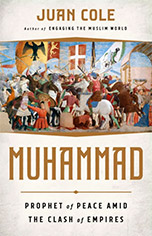An early chapter of the Qur’an is 90, “The City.” It contrasts the wealthy elite of Mecca in western Arabia in the 610s of the Common Era with the small band of Muhammad’s Believers. Verses 12-17 go this way:
And how would I make you understand the steep path?
It is freeing a slave
or feeding, during a famine,
an orphan related to you,
or a grubby vagrant.
Then he would be one of the believers who counseled patience and compassion.
The notion of charity is central to the Qur’an. Feeding the poor and the helpless, and manumitting the victims of human trafficking, are essential values. Note that at the time Muhammad was reciting these verses, he had very few followers. These verses do not pertain only to that tiny community but to society in general. The scripture’s compassion was meant to encompass all, including those enslaved, who were typically captured in battle during Bedouin raids from distant peoples and alien tribes.
I discuss these emphases in early Islam in my

Muhammad: Prophet of Peace amid the Clash of Empires, out October 9
*Now* available for order at Barnes and Noble
And Nicola’s Books in Ann Arbor
And Hachette
And Amazon
Also central to the Muslim scripture is the value of compassion (here, al-marhamah). Words from the same root form names of God, who is compassionate and merciful. The Qur’an, far from being stern or bleak, as many Western readers have described it, is full of warmth and fellow-feeling.
The root for compassion occurs 339 times in the Qur’an, including as an epithet for God himself. The root for the notion of forgiveness is used 234 times. In contrast, the primary word for fighting only occurs 170 times, and in some of those instances the Qur’an is condemning it.
The Qur’an in 90:17 is saying something very like Luke 6:36, “Be merciful, just as your Father is merciful.”
The Qur’an and the New Testament agree that mercy and compassion are key attributes of God himself, which human beings must strive to emulate.
While the importance of mercy and compassion as both a divine characteristic and a human imperative in Christianity and Buddhism are widely recognized, somehow the Qur’an’s endless repetition of this ethical principle has somehow been disregarded by outsiders.



 © 2026 All Rights Reserved
© 2026 All Rights Reserved